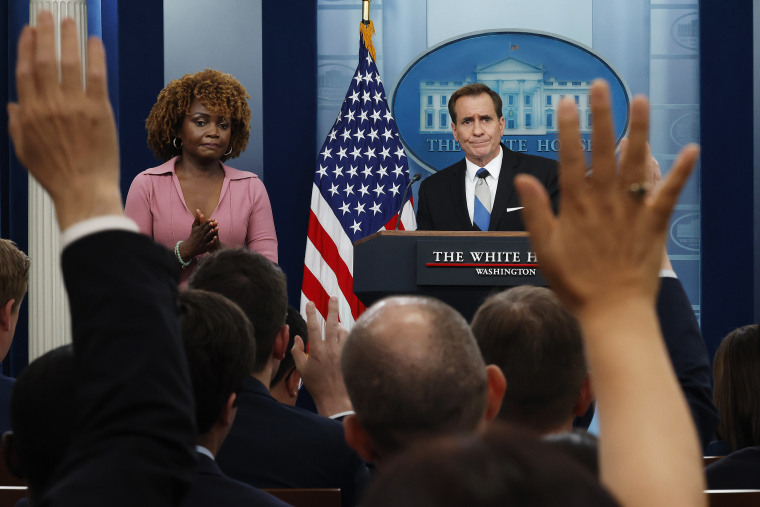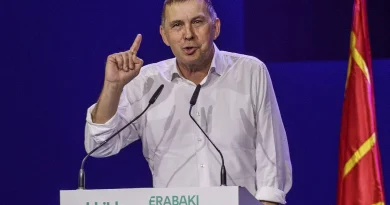Israel hasn’t crossed Biden’s ‘red line,’ White House says
As Israeli forces pushed deeper into Rafah just days after an airstrike sparked a major fire that killed dozens of Palestinians, the White House said that its ally had not crossed the Biden administration’s “red line.”
Israeli tanks were seen entering central Rafah for the first time Tuesday, as global condemnation mounted over the deaths in a crowded tent camp for displaced civilians and as U.S. aid deliveries to Gaza by sea were suspended after damage to its temporary pier. And on Wednesday the country’s national security adviser said that he expected the war to continue through the end of the year.
But National Security Council spokesman John Kirby told reporters at a briefing that the United States was not turning a “blind eye” to Israel’s operations in the southern Gaza city, from which around 1 million Palestinians have fled in recent weeks.
He said the Biden administration did not believe Israel’s actions in Rafah so far represented a “major ground operation” that would violate President Joe Biden’s warnings and trigger a change in U.S. policy, including a threatened halt to weapons shipments.
“A major ground operation is, you know, thousands and thousands of troops moving in a maneuvered, concentrated, coordinated way against a variety of targets on the ground,” he said.
A U.S. official similarly told NBC News that while America believed the deadly strike was a “horrific incident,” it appeared to be the result of an airstrike gone “horribly wrong” and didn’t represent Israel “smashing into Rafah.”
Biden told CNN earlier this month: “I made it clear that if they go into Rafah — they haven’t gone in Rafah yet — if they go into Rafah, I’m not supplying the weapons that have been used historically to deal with Rafah, to deal with the cities — that deal with that problem.”
Asked by NBC News’ Gabe Gutierrez how Israeli tanks appearing to near central Gaza did not represent a full-scale ground operation, Kirby said Israeli officials had maintained that their tanks were moving along the Philadelphi Corridor, a key strategic strip of land running along the Egypt-Gaza border, and “not in the town proper.”
“That’s what the Israelis have said,” Kirby responded. “We’re going based on what the Israelis are telling us and what they’re saying publicly and what we’re able to discern, as best we can.”

Kirby’s comments came just days after the Israeli airstrike sparked the fire that tore through the tent camp in Rafah’s Tal al-Sultan neighborhood, killing at least 45 people including children, according to local health officials.
Hala Rharrit, a U.S. diplomat and veteran foreign service officer who resigned from the State Department last month in protest over Washington’s policy on Israel’s war in Gaza, said she felt the Biden administration was now trying to “wiggle their way out of this latest shift” on what constitutes a “red line.”
“The point of the president saying population centers were a ‘red line’ is to avoid mass civilian casualties,” she said in a phone interview with NBC News on Wednesday. “Whether they’re going in by tanks or it’s happening via bombs coming from the air, are we really trying to mince words?”
The attack on the tent camp has added to growing international pressure after the United Nations’ top court ordered Israel to halt its offensive in Rafah. The U.N. Security Council could vote as early as Wednesday on a draft resolution circulated by Algeria ordering Israel to immediately stop its offensive and demanding a cease-fire in Gaza, according to The Associated Press.
Israel submitted a new cease-fire proposal to Qatari, Egyptian and American mediators Monday, an Israeli official told NBC News. The proposal offered a “sustainable calm” but not a complete end to the war as demanded by Hamas.
Basem Naim, a senior Hamas official, told NBC News on Tuesday that Hamas had not received any proposal from the mediators.
In a briefing Tuesday, Israel Defense Forces spokesman Rear Adm. Daniel Hagari said Israel was still investigating the Rafah strike, including what caused the fire that he said “resulted in this tragic loss of life.”
He said the IDF fired two 17 kilogram (37.5 pound) warheads targeting two senior Hamas militants, but he said somehow a fire was ignited, adding that the blaze was “unexpected and unintended.”
He suggested the possibility that weapons stored in the area targeted might have ignited the fire, but said that was an “assumption” at this point. An Israeli official and U.S. official separately told NBC News it was possible a fuel tank was struck, igniting the blaze.
The images from the strike have piled pressure on the U.S. to act.
Asked during Tuesday’s White House briefing how many “charred corpses” Biden needed to see before changing policy, Kirby said he took “offense” to the question, saying: “We don’t want to see a single more innocent life taken.”
The IDF has waged a monthslong ground offensive in Gaza during which more than 36,000 people have been killed, according to the Gaza Health Ministry.
Israel launched the offensive following Hamas’ Oct. 7 terror attacks, in which around 1,200 people were killed and some 250 others taken hostage, according to Israeli officials. Some 125 people are believed to remain held in Gaza, with at least around a third believed to be dead.
On Wednesday National Security Adviser Tzachi Hanegbi said on Israeli radio that “we still expect another 7 months of fighting this year to deepen the achievement and accomplish what we define as the destruction of Hamas’s governmental and military capabilities, without setting a stopwatch for ourselves.”
Biden’s warning over the U.S. “red line” is reminiscent of former President Barack Obama’s own use of the phrase in August 2012, when he issued a warning over the use of chemical weapons in the Syrian civil war.
Critics accused Obama of allowing that boundary to be crossed without action from the U.S., with political opponent John McCain saying the Obama administration’s red line appeared to be “written in disappearing ink.”




